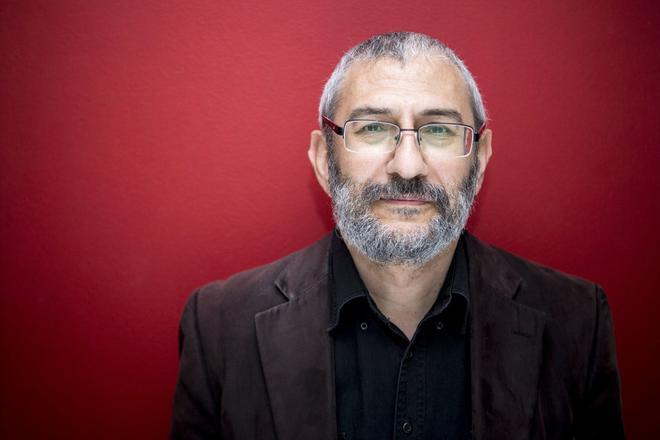TSS: PM Robert Fico recently spoke against fascism at the Holocaust memorial ceremony in Banská Bystrica. How do you see his anti-fascist statements in light of his other statements from the past, like “Islam has no place in Slovakia”?
GM:I evaluate positively all statements of any politicians clearly condemning fascism. Unfortunately, in Slovakia, fascism is nourished by various factors, and it has a very concrete expression in the form of a fascist party in the parliament. So a prime minister of a country in such a situation must speak clearly and openly. Unfortunately, it’s rather belated. Although he addresses the topic of fascism relatively often, but always in the historical perspective. Always connected with some anniversaries, like the Slovak National Uprising (SNP) or the Holocaust Remembrance Day. That is when he demonstrates his anti-fascism.

TSS: Is it common among Slovaks to perceive fascism only as a thing of history, not connected with some statements that they may hear from some politicians today?
GM:It is a prevailing trend, and quite understandable in a country that was under the fascist occupation during WW2. The historical forms of fascism, symbolic things, give people a clearer idea of what fascism is. But for responsible politicians who understand this is a multi-dimensional thing, fascism should not be limited only to its historical forms. Politicians should play a bigger role in making this clear to the public. The good thing is that when historical circumstances are mentioned, most people distance themselves from fascism. The SNP is valued quite highly, the wartime Slovak state is positively perceived by only a minority of Slovaks. This is also very important, but nowadays it does not seem to be enough to unmask those forms of extremism and nationalism that incline towards fascism.
TSS: Before the elections, the topic that helped extremists get into parliament, was anti-migrant and anti-refugee rhetoric, now Smer returns to the Roma.
GM:And the fascists return to the Jews.
TSS: You described that in your publication on the current state of the far right in Slovakia, that it is something like their signature theme, an element that they always go back to. But at the same time you wrote that it is not a mobilising topic.
GM:Yes, it cannot be a topic that Kotleba’s party can win its 200,000 or more votes on. The topic of migration is now slightly in the background because the EU has found some more effective ways how to cope with the problem. Which does not mean the problem has been solved, but it’s not on the front pages anymore. Roma are a real problem in Slovakia and there is experience that this topic may bring additional votes. But I think that Fico has made a huge mistake, just like when he was feeding the migration discourse now he is starting with the Roma, hoping to help his own party. It will not help his party, it will help those whom the potential voters so inclined perceive as authentic. And those are Kotleba and his party. Many of the party are anti-Semitic and they cannot help it, they just want to bring the Jewish card back into the game. It might also be an attempt to get something out of the conspiracy discourse where Jews are obviously part of various conspiracy constructs. Now they are gaining momentum thanks to social networks. So their themes are a mixture of revisionism, anti-Semitism, Holocaust denial, conspiracy theories, anti-Roma racism; it’s their menu and they pick something from it in each situation where they think it could work. But this should definitely provoke a clear response among the public and the mainstream politicians.

TSS: The ruling coalition said they would try to build a dam against extremism. Can you see any real effects that this is happening?
GM:Some laws are in preparation, some have been passed, like the law banning patrols in trains. They are adjusting to the atmosphere, but they are rather clumsy in doing that. Some of them are more engaged with the actual work, like the Justice Ministry, where Minister Lucia Žitňanská reacts to things that are happening and proposes laws. The SNS is reacting inadequately, and Robert Fico now speaks up against extremism but also spreads ideas that help extremism in my opinion. The scandal with Police Corps President Tibor Gašpar is unbelievable, that the police head signed a pamphlet of absolute non-sense, full of conspiracies that are typical for extremist or anti-system parties. So the picture is very diverse. They cannot be blamed for not doing anything, or not reacting in any way, but there does not seem to be any improvement.

TSS: In fact, the preferences of the ĽSNS have increased since the elections. Did you expect them to rise like this?
GM:I did not expect them to drop. This is not a party for instant use, it’s going to take a while. There are factors that nourish the support of these parties not only in Slovakia but also elsewhere in Europe. In Slovakia, appropriate attention has not been paid to this, and now the ruling coalition also consists of parties that have had their experiences, and not just positive ones - like SNS with its former chairman Jan Slota. They claim their belonging to anti-fascism, but in reality it is very partial, it varies from party to party. While Most-Híd is more principled, in Smer the nationalist trends are not completely invisible. But that does not mean ĽSNS has a chance to completely overrule it here. It is now part of the agenda of every mainstream party to distance themselves from this, and some are doing it better, some are doing it worse.

TSS: Because it’s not just about support for extremists, but also radicalisation of the mainstream. Is this happening in Slovakia? The Washington Post recently compared Trump to European far right and placed Fico as one of them. Was that adequate?
GM:Robert Fico did not appear in that Washington Post story by accident. The radicalisation is apparent also in his statements about “gypsies”. The way he grasps the topic, and all just to win support. Because the things he says now are not going to help, we recognise the causes of this problem, we know what needs to be done, that it is a complex and social problem. There have been thousands of pages written about how to deal with it. And he must know it. But the radicalisation, the will to win the hearts of voters with nationalist leanings, are stronger than the drive to provide real solutions for problems. He is getting closer to the radical right in his rhetoric. But the radical right is not ruling anywhere so far, and we do not know, and hopefully we will never know, how they would proceed if they had power.

TSS: But the far right still has rather strong support in many countries. In Slovakia we often talk about latent racism in the society, poor history education, not enough focus on critical thinking in schools, as if they were problems that only we face. But support for extremists is also growing elsewhere. Do they have the same problems?
GM:Problems of a similar type. For instance, the problem with migration in France, where there are millions of people who have not been sufficiently integrated in the society. I’m not making a direct comparison here with the situation of Roma in Slovakia. But in all these countries there are some problems of this type. And then there are specific issues. In Slovakia, it is the legacy of the wartime state and the historical revisionism, which is not as strong or even no longer exists in other countries.
TSS: In your publication you compare it to Germany.
GM:In Germany, democratisation was a so-to-speak democratising occupation. The process was very complicated, with numerous problems, and scandals. It took decades. But today it is inconceivable that anyone in Germany would refer to the Third Reich. Surely there have been some tendencies, but Germany from this perspective could be a source of inspiration for us how to suppress this historical element. In Slovakia, under communism it was a taboo and several circumstances that were uncomfortable for the society have not been spoken of.

TSS: We are living in gloomy times, many are pessimistic. What do you think? Is there a chance that this worrying development will take a different turn?
GM:It looks gloomy indeed, but I would not compare this situation with the situation in the thirties, because Europe is different. At that time, there was the Nazi regime and fascist regimes in other countries, today there are worrying tendencies when we see the rise of the far right. But there is the EU, the liberal democracy works, the majority of the public do not support these parties. The situation today is much better. It is worse compared to some five or ten years ago, but the society has many more tools to prevent the worst from happening. We will see how it goes with the US now. And there is one more thing we have not mentioned, and that is very significant, is the threat from the East. It is real, and we can only sense what would happen if the US withdrew from Europe. We know what happened in the past and there is no reason to think it would be any different now. Although Europe today is much stronger than the country that poses this threat.



 Grigorij Mesežnikov (source: Sme - Gabriel Kuchta)
Grigorij Mesežnikov (source: Sme - Gabriel Kuchta)